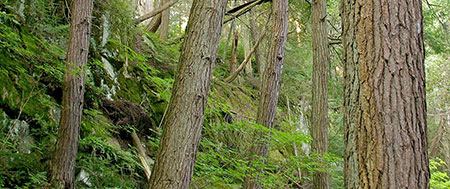
Through my community, academic and professional endeavours, I’ve been privileged to learn from and work with Indigenous youth and communities from coast to coast to coast, all across Canada. The work we collectively engage in is most often that of nation building and self-determination—articulating the values and aspirations that our Nations hold most dear, and then consciously creating a shared future that breathes life into those words by harnessing our collective knowledge, skills, perspectives and relationships.
Forests, so it seems to me at least, lie at the heart of many of those visions for the future. Indigenous peoples, knowledge systems, languages and cultures, it seems, remain inextricably tied to the lands and waterways we call home. Each is as unique and beautiful as the geography, itself, developed over countless generations of unbroken relationship with that singular place in nature. For many Indigenous peoples, then, forests are far more than simply a place to earn a living. For many, forests are classrooms, grocery stores, pharmacies, churches, playgrounds, places of healing, sources of profound serenity and so many other things. They are a living connection to all of the ancestors who once walked that very same land. And by maintaining respectful time-honoured relationships with that land, forests will serve as a continuous connection to all of the generations yet unborn.
As I now embark on a new journey with the Sustainable Forestry Initiative, I cannot help but carry with me that bundle of teachings, perspectives and visions for the future that have been so generously gifted by so many others, both young and old. I cannot help but be inspired to approach my work in a way that seeks to create space for those important voices and to share them with all of our dedicated partners throughout the SFI Community and beyond. I hope to do this by contributing to projects and initiatives across SFI’s Four Pillars of Community, Education, Conservation and Standards, including: directly engaging with Indigenous communities and businesses in both Canada and the US; designing an integrated youth engagement strategy for SFI and PLT Canada’s education programs; promoting employment opportunities for Indigenous youth through the Green Jobs initiative; fostering ongoing learning and dialogue throughout the SFI Community; and, supporting SFI Program Participants in building meaningful relationships with Indigenous communities in their local areas.
Indigenous or otherwise, I truly believe that many of us share the same guiding values and deep personal connections to our own special place in the forest. Perhaps, then, forests can be the unifying force that helps to foster constructive multi-directional and cross-cultural dialogue. Perhaps, then, forests can support shared understandings between communities, while also leaving space for the uniqueness and respectful differences that make us collectively resilient. Perhaps, then, forests can catalyze the building of diverse and empowered relationship networks. And perhaps, then, forests can ultimately allow us to collectively envision and achieve a sustainable future for us all.
Paul Robitaille
Master of Science in Forestry, Lakehead University
Provincial Chair, Metis Nation of Ontario Youth Council (MNOYC)
Advisor, Community Advisory Group, Ontario Human Rights Commission (OHRC)
